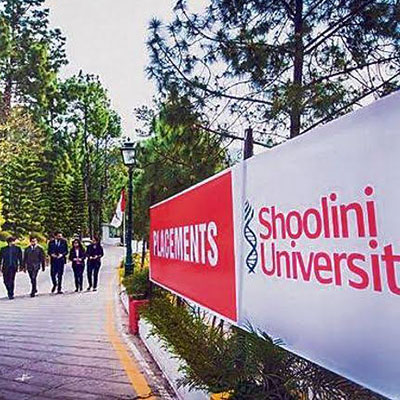SHOOLINI UNIVERSITY BECOMES UNIVERSITY OF MELBOURNE’S FIRST DUAL-DEGREE PARTNER AMONG PRIVATE INDIAN UNIVERSITIES
 In a groundbreaking dual-degree partnership, Shoolini University, India’s top-ranked private university, has teamed up with the prestigious University of Melbourne, offering unparalleled opportunities for international education to Indian students. This development marks the University of Melbourne’s first dual-degree collaboration with a private Indian university and highlights Shoolini University’s exceptional credentials and reputation.
In a groundbreaking dual-degree partnership, Shoolini University, India’s top-ranked private university, has teamed up with the prestigious University of Melbourne, offering unparalleled opportunities for international education to Indian students. This development marks the University of Melbourne’s first dual-degree collaboration with a private Indian university and highlights Shoolini University’s exceptional credentials and reputation.
With Shoolini University recognized as India’s first-ranked private university, and the country’s second-ranked university overall, by the esteemed Times Higher Education (THE) World University Rankings, and the University of Melbourne’s standing as Australia’s foremost university, ranked number one in the country and 34th worldwide, this partnership sets a new standard for academic excellence and innovation.
The dual degree program, starting with the Bachelor of Science Advanced (Honours), provides students with a world-class curriculum and opens doors to a truly global education experience. Under this landmark agreement, Indian students gain a unique advantage with the dual degree program, allowing them to pursue undergraduate studies in science at both home and the University of Melbourne. The transformative journey begins with two years at Shoolini University, followed by two years at Melbourne. In years 3 and 4, students can choose from diverse multidisciplinary majors, including Agriculture, Sustainability and Environment, Biosciences, and Computer Sciences, offering a truly global education experience.
Expressing his enthusiasm for the partnership, Professor Atul Khosla Vice-Chancellor Shoolini University stated, “We are thrilled to provide our exceptional undergraduate students with enhanced opportunities to study internationally. This collaboration with the University of Melbourne underscores the global standing of Shoolini University as a world-class institution. Furthermore, it opens the doors to many more opportunities for our students.”
As an added advantage, eligible students may opt to extend their studies for an additional year, completing a Master’s of Science at the University of Melbourne. Moreover, students who meet the Australian government criteria will have the option to apply for post-study work rights upon completion of their studies in Australia.
Professor Michael Wesley, Deputy Vice-Chancellor Global, Culture and Engagement, University of Melbourne, emphasized the value of this partnership for high-achieving Indian students, stating, “We are delighted to work with Shoolini University to provide students with a truly global education and the chance to build an international professional network. This partnership further demonstrates our commitment to long-term collaborations with premium Indian universities and connecting Indian students to our vast network of half a million global alumni.”
The curriculum of this program reflects the rigorous standards upheld by the University of Melbourne. Moreover, Shoolini University faculty members will visit Melbourne for practical training, fostering a greater exchange of knowledge between the two institutions.
Together, Shoolini University and the University of Melbourne are paving the way for Indian students to access exceptional global education, fostering a new generation of highly skilled professionals prepared to thrive in today’s interconnected world.
The momentous partnership was solidified during a meeting, held last week, between a delegation from Shoolini University, led by Vice-Chancellor, Professor Atul Khosla and comprising Trustee and Director Admissions Avnee Khosla, Dean, Research Dr Saurabh Kulshrestha and Associate Director Dr Rosey Dhanta, and senior executives from the University of Melbourne, including Deputy Vice-Chancellor Global, Culture and Engagement Professor Michael Wesley. The meeting paved the way for a collaboration that will mutually benefit both universities and their students.


